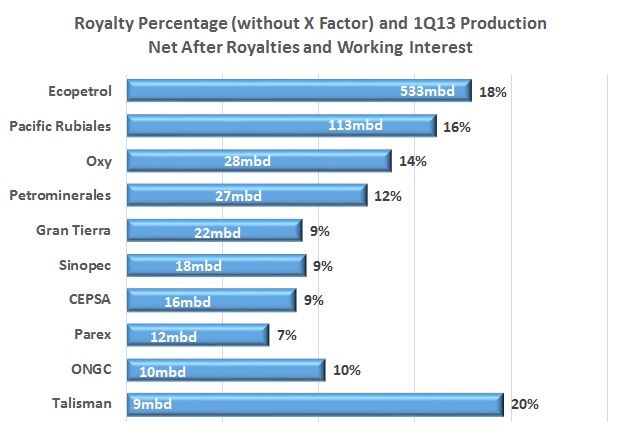Ecopetrol’s president Javier Gutiérrez said this week that the NOC continues to evaluate fundamentals to decide if it will extend or not the concession of the Rubiales field with Canada’s Pacific Rubiales Energy past its current expiration date in 2016.

The average royalty rate in Colombia is 16% but the graph shows considerable variation between the leading producers.
A law prohibiting the procurement of land within a 5KM diameter of an oil well in Casanare has the titling process of land at a standstill in the department.
Five Casanare mayors spoke out against seismic testing Ecopetrol has planned for its Odisea 3D project in Casanare, alleging the testing is performed without adequate control and affects water sources and the environment in general.
The National Infrastructure Agency (ANI) has presented a CoP$7T (US$3.7B) budget for “megaprojects” to improve road infrastructure in the Meta Department, considering the increased oil production, agro-industrial development and general increase in the department’s commercial activity.
In order to finance infrastructure investments in roads, bridges, airports and other items holding back Colombia’s development Ecopetrol should sell an additional 10% of its shares to private investors, says the president of Colombia’s National Association of Financial Institutions (ANIF).
Citing a “high rate of accidents” due to the amount of heavy trucks on the roads in Casanare, the Casanare Secretary of Transportation has issued a resolution that prohibits heavy trucks, including the tankers carrying oil, from using the roadways on weekends on holidays.
Average daily production of oil in July 2013 in Colombia reached a new record of 1,020,000 barrels per day, a 14.8% increase over the same period last year, and comes despite a number of strikes, blockades and protests in oil production regions.
A subject of contentious debate, the new royalty system has its share of critics and the director of the National Planning Department (DNP) looked to quell detractors while speaking on the advances of the government during the current administration’s 3 years in office.
Colombia’s Ministry of Environment and Sustainable Development (MinAmbiente) responded to the doubts of President Juan Manuel Santos on environmental licensing and the management of the Autonomous Regional Corporation (CAR) in an accountability session and published a summary of its message on its webpage.